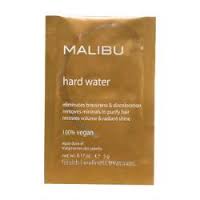The first semester of the year can be a stressful time, new classes, new friends and new activities. As the semester progresses we may notice our hair feeling fine and beginning to thin out. You may believe this is due to all this new found stress and activity, however, this is not the case. The water we use to shower everyday is the source that is essentially killing our hair. I uncovered this the hard way, my hair began to fall out and literally turn green, yes you heard me right green. Penn State water is unlike anything we are used to, Penn State uses a type of “well water.” Well water is made up on minerals such as magnesium and calcium and can be extremely tough on your already vulnerable hair. According to the U.S. Geological Survey, it is estimated that more than 85% of the water used by consumers in the US can be classified at some level of “hard” water. Due to the lightness of my hair the chemicals in the well water tinted parts of my hair green, the type of hair you would find with chlorine damage. I noticed my hair breaking as well, so I called up my hair dresser who explained this water theory to me. These chemicals can even damage your skin and your scalp. Hard water makes it difficult to even wash your hair, leaving your hair feeling greasy and dirty. Hard water tends to make the scales stand up, which makes your hair feel rough and tangly. Since your hair is tangled and rough, it is more difficult to rinse out all of the soap. Soap is less effective in very hard water because its reacts with the excess minerals to form calcium or magnesium salts. Over the past few weeks I have been extremely cautious when it comes to treating my hair and here are some tips I have discovered:
Treatments
- there are treatments you can buy in stores or make at home that strip your hair of the chemicals from the hard water
- Filtering your water, there are filters you can buy and place on your shower head
Well water is all around us and we need to be educated on the subject in order to ensure healthy hair. Please monitor your showers and if your hair is starting to feel damaged, take action to save it!
http://www.chagrinvalleysoapandsalve.com/idascorner/shampoo-hair/how-does-your-water-affect-your-hair
http://thepioneerwoman.com/life-and-style/help-well-water-is-ruining-my-hair/



This is very interesting actually, I mean your hair really turned green? But this post has much opportunity. Sure we are all exposed to well water, but what does that really mean? You should reference and analyze a study, as subjects could be split up in a randomized control experiment to see the differences between showering with well water and normal tap water/distilled water. This post can also dwell into the affects of drinking such water, or how well water affects different hair types and colors, as here are some facts about well water benefits that you could elaborate on: http://www.livestrong.com/article/121718-benefits-well-water/. Though I am skeptic of the known Penn State Showers, I think I am still just gonna bear through it for freshman year.
I’ve always been annoyed by the “hard water” at Penn State, so I’m glad you made this blog post addressing the issue. I would be interested in seeing some data to support the theory, like statistics. I also wonder if any other factors might contribute to hair turning green or having it fall out. For instance, a few confounding variables could be diet, genetics, and the type of hair and products that are used. I also wish we could have seen more examples of how Penn State water directly affects students’ hair. Some sort of article that explores this topic a bit more, with evidence to support it. I would probably conduct an experiment testing the theory that Penn State water definitely damages hair. I’d compare hair before and after and then make a conclusion based on the results from the experiment.